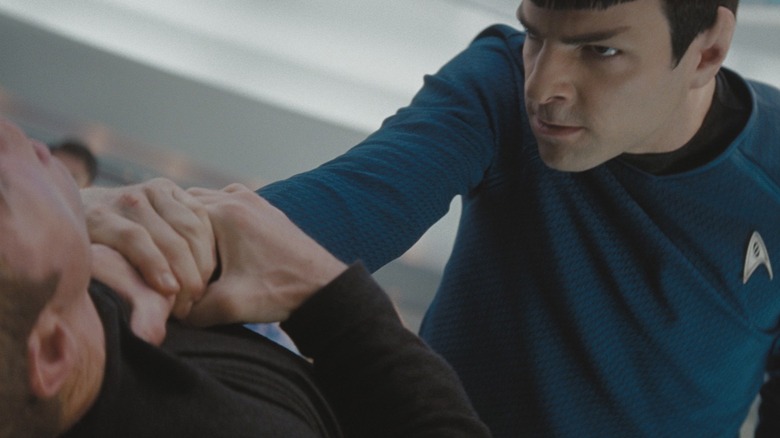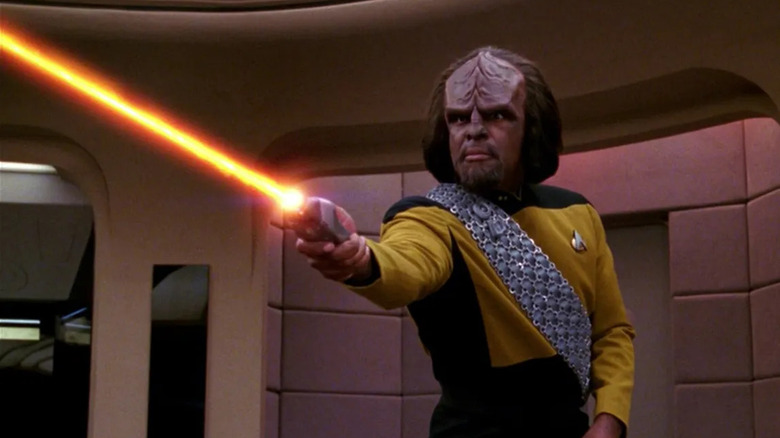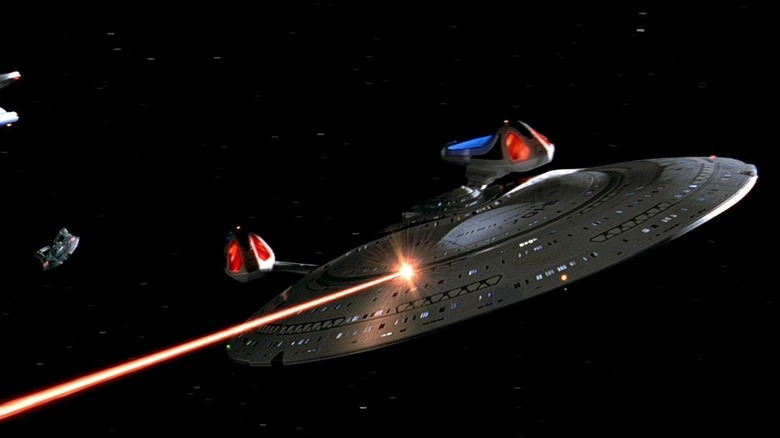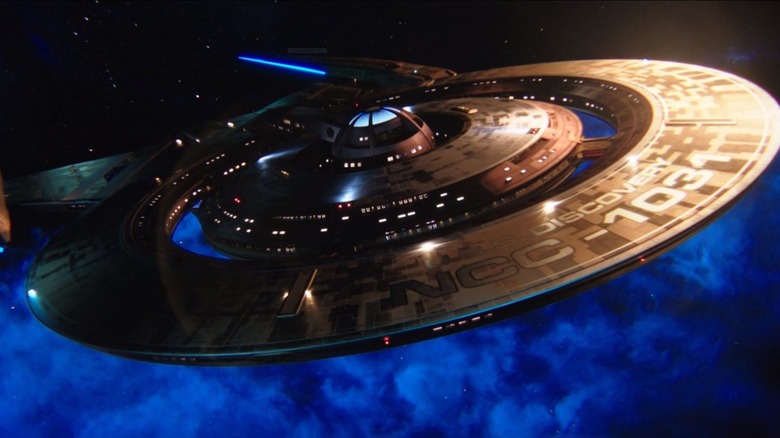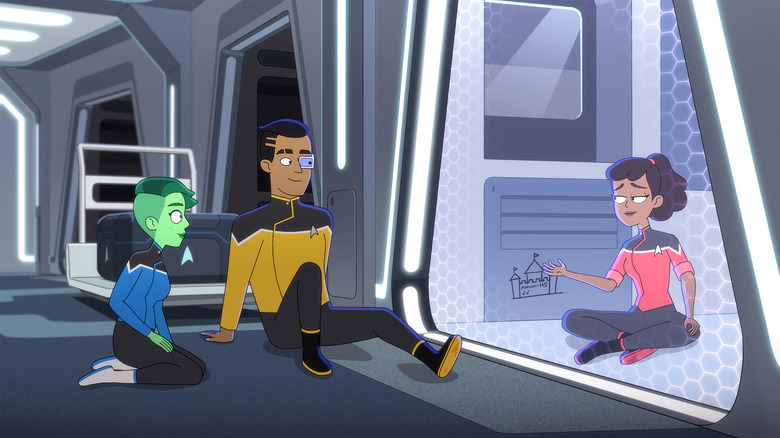Star Trek Isn't An Action Franchise, And It's Best When It Remembers That
One of the greatest strengths of "Star Trek," and perhaps the primary reason for its longevity, is the show's versatility. While Trek, overall, operates in a technological utopia driven by notions of pacifism, diplomacy, and scientific curiosity, any single given episode can operate in a different genre.
Some episodes deal with heady sci-fi concepts, as when Capt. Picard (Patrick Stewart) has to argue in a court of law whether or not the android Data (Brent Spiner) is actually sentient. Other episodes are political thrillers, as when Maj. Kira (Nana Visitor) expresses frustration that her home planet of Bajor is slipping into a corrupt theocracy. Some episodes are outwardly comedic, as when Capt. Kirk (William Shatner) has to wrangle a bunch of hungry tribbles. There are even horror episodes. Nothing is more terrifying than the scene in the "Star Trek: The Next Generation" episode "Night Terrors" (March 18, 1991) where Dr. Crusher (Gates McFadden) is walking through a mortuary and the bagged corpses all begin sitting up.
Only very occasionally, classic "Trek" would have an outright action-based episode, wherein firefights and explosions solved problems. One might point to the original series episode "Balance of Terror" (December 15, 1966), a story about Kirk facing off in combat against an invisible Romulan ship. A savvy Trekkie will also be quick to point to Nicholas Meyer's 1982 feature "Star Trek II: The Wrath of Khan," as that film climaxes with a tense, submarine-like battle in a nebula with two ships slowly doing damage to one another.
Star Trek Into Action
For many years, however, these action-based moments in "Trek" were outliers. In Gene Roddenberry's idyllic future, conflicts would be solved with words and understanding, not with might, military force, or brute strength. The action episodes were, as this Trekkie sees it, a small break in the diplomatic status quo. There's a reason why so many early "Star Trek" video games were so bad: it was difficult to mine a peace-based franchise for the interactive mayhem that video games so often required. When nerds idly pondered who would win in a fight between a Galaxy-class starship and, say, a Star Destroyer from "Star Wars," good Trekkies would instantly ask if diplomatic negotiations between the Federation and the Empire had broken down prior to the battle. Who cares who would win in a fight, Trekkies posited, if we don't know why they are fighting?
This writer can't point to the exact moment when it happened, but sometime in the 1990s, "Star Trek II" became generally accepted as the best of the "Star Trek" films. Many enjoyed the action-packed ending, and the villainous title character played by Ricardo Montalbán. Unlike the slow and contemplative "Star Trek: The Motion Picture," "Khan" was exciting, fast-paced, and violent. After the canonization of "Khan," much of "Trek" — the movies in particular — became much more action-forward. It didn't matter if the cast was ill-suited to combat and phaser battles, they would be included. Indeed, all of the "Trek" films since 2001 — "Nemesis," "Star Trek" (2009), "Into Darkness," and "Beyond" — have featured revenge-minded villains who seek to destroy either the Federation or a Starfleet captain.
The 1996 film "Star Trek: First Contact" was also very much an action flick, albeit with a Borg supervillain, not a revenge-based one.
But those are the exceptions
The movies, however, aren't typically emblematic of the franchise as a whole. "Trek" has always excelled the most when it remains in the realm of episodic, miniature morality plays on television. When moving to the big screen, giant budgets and "event" addiction demanded more significant stories with larger, faster stakes. The shortcut many filmmakers would take was to up the spectacle and juice up the shooting.
When "Trek" starts with a basis of action, it tends to become something else. Something that's not "Star Trek." In 2009, when J.J. Abrams made his "Star Trek" movie, he shifted the entire notion of "Trek" into overdrive. The characters were younger, more impulsive, and more given to rash decisions and violent solutions. They weren't yet the experienced, adult diplomats of the 1960s, leading to shooting and choking and shouting and death. This was a film that featured Sulu (John Cho) skydiving onto a tower-sized mega-chain to swordfight with an evil alien soldier. In contrast, "Star Trek: The Motion Picture" featured 20 minutes of floating through an ineffable space cloud, contemplating the enormity of the cosmos.
One of those films is about committing acts of violence to stop another act of violence. The solution will involve stabbing someone through the stomach. The other is about expanding one's mind to understand a vague threat. It's about seeing life as larger and more abstract than humanity previously considered.
The latter film is more in-keeping with the spirit of "Trek." The former film ... isn't.
The Next Next Generation
One can see why "Star Trek" shifted, of course. In the wake of 9/11, audiences were seemingly no longer in the mood for a world where diplomacy is key and negotiations were open. The United States, if the nation's policy was any indicator, was keen on charging into war and punishing those responsible, even if it meant torturing people. Revenge and trauma became common themes in popular entertainment, as did stories of superpowered beings who had the ability to stop infiltrating, destructive "enemies." As a result, "Star Trek" became more action- and revenge-forward.
War, it seems, was now just as inevitable in "Trek" as it was in our own world. So much for Roddenberry's peaceful vision of the future.
This notion — of "Star Trek" taking place in a degraded world marked by inevitable war — leaked into the launch of CBS All-Access (later, Paramount+) as late as 2017. "Star Trek: Discovery" was a very, very violent show, and the main characters all regularly committed acts of murder. Diplomacy wasn't even entertained in most cases, and the U.S.S. Discovery — like Jack Bauer in "24" — was always in a rush to solve a desperate, violent problem. While the creators of "Discovery" were clearly abiding by a self-imposed mandate to assure viewers that "this ain't your granddad's 'Star Trek,'" they were also responding to the popularity of a decade of action-packed "Star Trek" shows based on revenge and other shallow action movie tropes.
This ethos also bled into "Star Trek: Picard," another show stuffed with homicidal characters. This show featured a scene wherein the Borg child Icheb had his eyeball forcibly severed while he was still conscious. I love violence, but, uh, c'mon.
Getting back to basics
To clarify: action, when done well, is exhilarating and fun. There's nothing wrong with the crew of the Enterprise, Deep Space Nine, the Voyager, the Discovery, or the Cerritos occasionally getting into a firefight. Even in a peaceful future, "Star Trek" has allowed for moments when misunderstandings lead to exchanged phaser fire. Note, though, that phasers typically stun a foe or disable their ship's shields. The fight is all well and good, so long as — in true "Star Trek" fashion — it was part of an extended process of negotiations.
Two of the more recent shows, "Star Trek: Lower Decks" and "Star Trek: Strange New Worlds," seem to understand that "Trek" is not an action franchise. Those are shows about character, workplace drama, and problems that require thought and cleverness to escape. None of the characters in these two series are ultra-cool, unstoppable fighting machines. They are free to make mistakes, are driven by their joys and passions, and grow as individuals.
The excitement of rapid-fire, machine gun-like weapons, constant death, and the aggression of war should be left behind. Trek has always been better without it. When viewers can watch a "Star Trek" show and feel optimistic about the future, it transcends. When the future looks like a place of death and fighting and action, action, action, it has strayed from the franchise's basic thesis.
If you want a sci-fi universe where war never ends, "Star Wars" is just across the hall.
